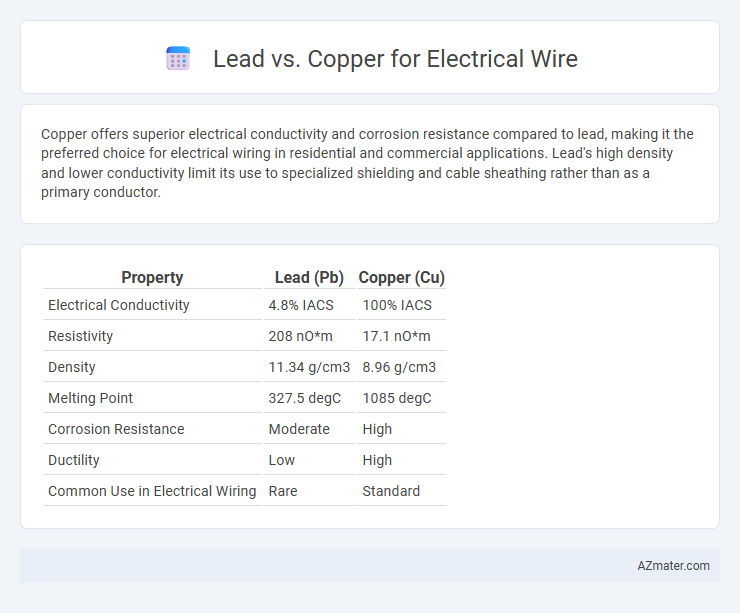Copper offers superior electrical conductivity and corrosion resistance compared to lead, making it the preferred choice for electrical wiring in residential and commercial applications. Lead's high density and lower conductivity limit its use to specialized shielding and cable sheathing rather than as a primary conductor.
Table of Comparison
| Property | Lead (Pb) | Copper (Cu) |
|---|---|---|
| Electrical Conductivity | 4.8% IACS | 100% IACS |
| Resistivity | 208 nO*m | 17.1 nO*m |
| Density | 11.34 g/cm3 | 8.96 g/cm3 |
| Melting Point | 327.5 degC | 1085 degC |
| Corrosion Resistance | Moderate | High |
| Ductility | Low | High |
| Common Use in Electrical Wiring | Rare | Standard |
Introduction to Electrical Wire Materials
Electrical wire materials primarily include copper and lead, each offering unique properties for conductivity and durability. Copper is favored for its excellent electrical conductivity, flexibility, and corrosion resistance, making it ideal for residential and industrial wiring. Lead, although less common today due to toxicity concerns, was historically used for its high malleability and resistance to moisture in underground or specialized applications.
Key Properties of Lead vs Copper
Lead offers high density and excellent corrosion resistance, but its low electrical conductivity and softness limit its suitability for electrical wiring. Copper provides superior electrical conductivity, mechanical strength, and ductility, making it the preferred choice for efficient and durable electrical wire. The thermal conductivity of copper also enables better heat dissipation compared to lead, enhancing safety and performance in electrical systems.
Electrical Conductivity Comparison
Copper exhibits significantly higher electrical conductivity than lead, with copper's conductivity approximately 5.96 x 10^7 S/m compared to lead's much lower conductivity of about 4.8 x 10^6 S/m. This difference makes copper a preferred material for electrical wiring, as it allows efficient current flow with minimal energy loss and heat generation. Lead's poor conductivity results in higher resistive losses, limiting its suitability for most electrical applications requiring reliable and efficient power transmission.
Thermal Performance of Lead and Copper
Copper exhibits superior thermal conductivity around 400 W/m*K compared to lead's approximate 35 W/m*K, enabling more efficient heat dissipation in electrical wiring applications. This higher thermal performance reduces the risk of overheating and energy loss in copper wires, making them ideal for high-current and high-temperature environments. Lead's lower thermal conductivity limits its effectiveness in managing heat, often resulting in increased thermal stress and potential insulation degradation over time.
Durability and Longevity in Wiring
Copper electrical wire offers superior durability and longevity compared to lead due to its high tensile strength and resistance to corrosion, ensuring reliable performance over decades. Lead, while flexible and corrosion-resistant in some environments, is softer and more prone to mechanical damage, reducing its lifespan in wiring applications. Copper's excellent conductivity combined with its robustness makes it the preferred choice for durable and long-lasting electrical wiring systems.
Safety and Health Considerations
Lead electrical wire poses significant health risks due to lead's toxicity and potential for causing neurological damage, especially with prolonged exposure or in poorly insulated installations. Copper wire, being non-toxic and highly conductive, is considered safer for electrical wiring, reducing the risk of electrical fires and health hazards. Proper insulation and handling are crucial for both materials to minimize exposure and ensure electrical safety compliance.
Cost and Economic Factors
Copper electrical wire typically costs more upfront than lead wire due to copper's higher market price and superior conductivity, which reduces energy losses and maintenance over time. Lead wiring, although cheaper initially, poses higher long-term economic risks given its lower conductivity, greater weight, and susceptibility to corrosion, leading to increased replacement and repair expenses. Considering lifecycle costs, copper's durability and efficiency often make it a more cost-effective choice for electrical wiring applications.
Environmental Impact Assessment
Lead poses significant environmental hazards in electrical wiring due to its toxicity and persistence in soil and water, leading to long-term contamination risks during manufacturing, use, and disposal. Copper, while more environmentally friendly, requires energy-intensive mining and processing, contributing to greenhouse gas emissions and habitat disruption, but it is highly recyclable with minimal quality loss, reducing its overall environmental footprint. Life cycle assessments reveal copper's recyclability and lower toxicity offer advantages over lead, making it a preferable choice in sustainable electrical wire production and use.
Common Applications and Use Cases
Lead and copper serve distinct roles in electrical wiring, with copper being the preferred choice due to its excellent electrical conductivity and durability. Copper wiring is commonly used in residential, commercial, and industrial buildings, as well as in telecommunications and power generation systems. Lead, on the other hand, is rarely used for electrical conductors but may be found in specialized applications such as shielding cables or corrosion-resistant environments.
Conclusion: Choosing the Right Material
Copper remains the preferred choice for electrical wiring due to its superior electrical conductivity, durability, and resistance to corrosion. Lead, although malleable and historically used for insulation, poses health hazards and lower conductivity, making it unsuitable for modern electrical applications. Selecting copper ensures safer, more efficient, and longer-lasting electrical installations.

Infographic: Lead vs Copper for Electrical Wire
 azmater.com
azmater.com